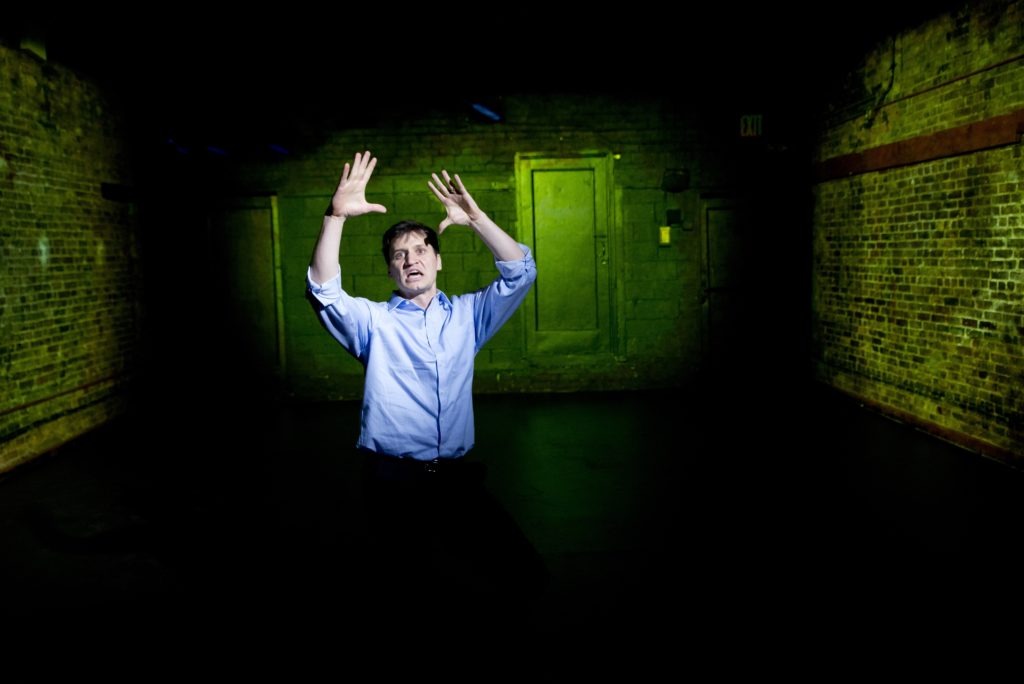Director Kel Haney didn’t know much about Tourette Syndrome before she met actor Gardiner Comfort. She wasn’t alone in her unawareness. The cause of neuropsychiatric disorder remains a mystery even to neurologists and other medical experts.
Still, Haney and Comfort have joined forces to skillfully share Comfort’s trials and experiences in the show, The Elephant in Every Room I Enter. The solo show is the second in New York Theater Workshop’s inaugural Next Door at NYTW season. The work has had other incarnations, most notably at the La MaMa Theater Club. It chronicles Comfort’s week long trip to Washington, D.C. for a National Conference on Tourette syndrome. Comfort, a New York native, was diagnosed with the symptom when he was 7.
For Haney, the artistic collaboration has provided her with much more insight and compassion into the syndrome– and to those who cope with it on a daily basis. Even audience response to the show has been surprising. “In creating this piece with Gardiner, I wasn’t thinking that it would so overtly advocate for Tourette syndrome,” she said during a recent phone conversation with Manhattan Digest. “But people started sharing their stories about themselves or family members who have it. A little bit of awareness goes a long way,” she added.
Haney continued the dialogue by answering some of our questions.
MD: This is the second show you’ve done with Gardiner. How did your artistic collaboration emerge?
KH: I originally met him through his wife, the actor/writer Colleen Werthmann, a founding member of Elevator Repair Service and the Civilians. We worked together on a play reading. At that moment, the bulk of my career was in directing people’s solo work. She told me about Gardiner, who was looking for a new collaborator. He was offered a residency at Mabou Mines (an East Village theater company), and asked me to come on board. I told him that I’d join if we could generate some autobiographical material. He would just talk and I’d write ideas on index cards.
We started by working on a piece that dealt with his experience of gentrification while growing up in NYC– and his exploration of hip-hop. Then, he went to the Tourette’s conference in Washington, D.C. He emailed me about the experiences he was having and when he came back, he went through the events day by day. I turned to him and said, “I think that this is our show!” We had 6 weeks left in the residency but scrapped our initial idea and worked really hard on this piece.

MD: How did this show evolve and how much of it has changed from its time at LaMaMa?
KH: It’s basically the same show, but we’ve made alterations with the projections due to space constraints. We’re interested in taking this to theaters across the country, so this staging would really support that.
MD: Tourette’s seems to be a physically harmless disease, but are there cases where it can be injurious?
KH: Yes. There’s actually in the line in the play where Gardiner mentions suffering a broken rib from ticcing. Tics can also change throughout life. Gardiner has different ones now than he did 4 years ago.
MD: The syndrome can often affect friendships and romances as well. Gardiner doesn’t delve too deeply into that aspect of his life. Do you know how it has affected his personal relationships?
KH: It’s a larger question really. How does it affects his relationship with Colleen, his acting career, his daily commute? The blanket answer is that there is no separation. He mentions in the play that it affects every aspect of his life all the time. It’s hard to know what is Gardiner is and what is the Tourette’s. They are one in the same. Both he and Colleen are very smart and very acerbic and Colleen has been his biggest supporter. Gardiner and I would not have collaborated had it not been for her.
MD: What are some of the biggest misconceptions people have about Tourette Syndrome?
KH: I feel a bit outside of the community, but generally I would say that people assume that those with Tourette’s randomly curse. Only 10% of people diagnosed with the syndrome suffer that symptom.

MD: What do you hope people will take away from this show?
KH: I hope that people will have some more compassion and awareness. If they see someone who is acting differently, to think that maybe that person has something medical going on with them or it is something they can’t help.
The other aspect is to understand that there is a real beauty to the syndrome. Gardiner openly says that if there were a cure, he wouldn’t take it. He’s my collaborator and friend. He’s bright, funny, and captivating and talented. If he didn’t have Tourette’s, he wouldn’t be that same person. There is a real beauty in all the things that make us different in addition to us having compassion for people having a harder time getting through life.
MD: What’s next for the life of this show?
KH: The week after we close, we’ll present a pared down version of the show at Mt. Sinai for the med students. We’re also going to a theater complex in New Jersey that has a storytelling program. We’ll do the show there and have some workshops.
In the larger sense, I’m hoping to take the show to Scotland’s Edinboro Fringe Festival. We’d also like to have an outreach in medical schools and communities to advocate and educate.
Tickets for The Elephant in Every Room I Enter (running through November 25th) and every production at Next Door at NYTW are available online at NYTW.org, by phone at 212-460-5475, or in-person at the NYTW Box Office (79 East 4th St. (btwn Bowery & 2nd Ave.
